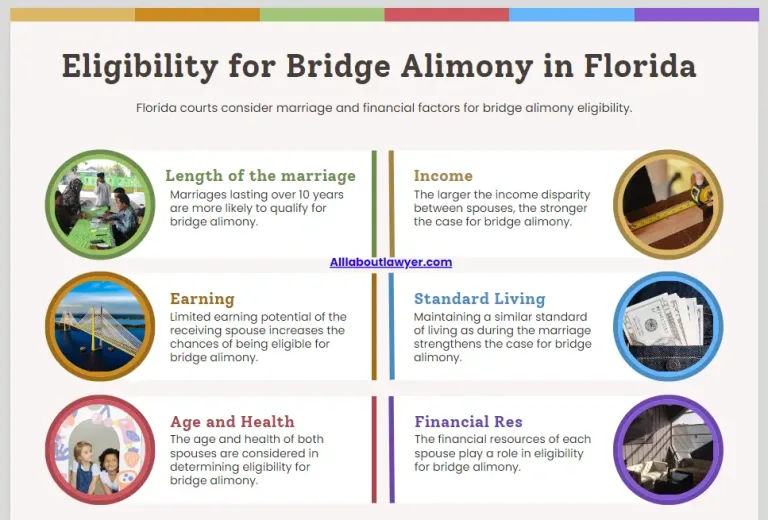Bridge The Gap Alimony Florida Options for Temporary Spousal Support
Divorce can cause significant financial strain, especially in Florida where, according to recent statistics, approximately 40% of marriages end in divorce. If you’re considering divorce in Florida, it’s crucial to explore potential solutions to ease this transition. One such option is “bridge the gap alimony Florida,” a form of temporary spousal support designed to help maintain your standard of living during the divorce process.
This comprehensive guide is tailored for individuals facing divorce and finances in Florida who may need temporary financial assistance. We’ll explore the ins and outs of bridge alimony, its purpose, eligibility criteria, and alternatives to help you make informed decisions during this challenging time.
Table of Contents
What is Bridge Alimony?
Bridge alimony, also known as temporary spousal support Florida or spousal maintenance Florida, is a type of spousal support arrangement intended to help a spouse maintain their standard of living during the divorce transition. The purpose of bridge alimony Florida is to provide temporary support until the recipient can become self-sufficient.
Duration of Bridge Alimony
Unlike other forms of alimony, bridge alimony is typically short-term alimony in Florida, lasting until a specific event occurs or for a limited period. This duration is determined based on the individual circumstances of each case.
Reasons for Bridge Alimony
There are several potential purposes for bridge alimony, including:
1. Allowing a stay-at-home spouse time to re-enter the workforce
2. Providing funds for education or job training (re-training for stay-at-home spouse Florida)
3. Covering relocation expenses for new employment opportunities
Eligibility for Bridge Alimony in Florida

When determining eligibility for bridge alimony Florida, courts consider various factors, including:
– Length of the marriage (e.g., marriages lasting over 10 years are more likely to qualify)
– Income disparity between spouses (larger disparity strengthens the case)
– The receiving spouse’s earning capacity (limited earning potential increases chances)
– Standard of living during the marriage (maintaining a similar standard strengthens the case)
– Age and health of both spouses
– Each spouse’s financial resources
– Contributions to the marriage (both financial and non-financial)
It’s important to note that bridge alimony is not guaranteed in every divorce case. The question “Can I get bridge alimony in Florida?” depends on your specific circumstances and the court’s evaluation of the factors mentioned above.
Alternatives to Bridge Alimony
Depending on your situation, there may be other spousal support options available in Florida:
1. Rehabilitative alimony:
Designed to help a spouse gain education or training for self-support
Provides support for a set period, not exceeding the length of the marriage
3. Permanent alimony Florida:
In cases of long-term marriages or where one spouse is unable to become self-supporting
Some couples choose to negotiate spousal support terms through divorce mediation Florida. Financial mediation during divorce can allow for more flexible and creative solutions to address financial concerns.
Look For Legal Guidance
Given the complexities of Florida alimony laws and the specific requirements for bridge alimony, it’s highly recommended to look for legal help with alimony Florida. A qualified Florida divorce attorney can:
– Help you understand your rights and options regarding bridge alimony
– Evaluate your eligibility based on your specific circumstances
– Navigate the legal process and advocate for your interests
– Ensure compliance with Florida alimony laws
Look for an attorney specializing in alimony Florida to ensure you receive the most accurate and up-to-date advice for your situation.
Conclusion: Making Informed Decisions
Financial planning for divorce Florida is crucial for your long-term well-being. Understanding Bridge the gap alimony Florida as a potential temporary financial assistance during divorce can help you make informed choices during this challenging time.
Next steps:
1. Gather financial documents for divorce Florida, including income statements, tax returns, and information about marital assets.
2. Schedule a consultation with a divorce lawyer in Florida to discuss your specific situation and explore your options.
3. Consider all aspects of your financial future when making decisions about alimony and property division.
Remember, proper preparation and expert guidance can significantly impact your financial stability during and after divorce.
FAQs
1. What is bridge alimony and how does it differ from other types of alimony?
Bridge alimony is temporary financial support to help a spouse adjust financially during the divorce transition. Other types, like permanent alimony, might provide longer-term support.
2. How long does bridge alimony typically last in Florida?
Bridge alimony is short-term, usually lasting for a set period or until a specific event, like completing a training program.
3. Do I automatically qualify for bridge alimony in Florida?
No. Courts consider factors like the length of the marriage, income disparity, and your earning capacity. Consulting a Florida divorce attorney is recommended.
4. What are some reasons why a court might award bridge alimony?
Common reasons include allowing a stay-at-home spouse to re-enter the workforce, covering education costs for new job skills, or facilitating relocation for a job opportunity.
5. Are there alternatives to bridge alimony?
Yes, depending on the circumstances. Florida recognizes other spousal support options like rehabilitative alimony (for job training) or permanent alimony (in long-term marriages).
By understanding bridge alimony and other financial considerations during divorce Florida, you can better prepare for this significant life transition and work towards a more stable financial future.
About the Author

Sarah Klein, JD, is a former family law attorney with over a decade of courtroom and mediation experience. She has represented clients in divorce, custody cases, adoption, Alimony, and domestic violence cases across multiple U.S. jurisdictions.
At All About Lawyer, Sarah now uses her deep legal background to create easy-to-understand guides that help families navigate the legal system with clarity and confidence.
Every article is based on her real-world legal experience and reviewed to reflect current laws.
Read more about Sarah
